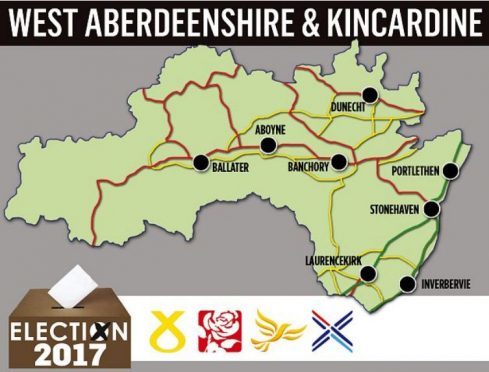It’s a running joke among the candidates for West Aberdeenshire and Kincardine that if seen together voters might mistake them for a boy band – especially if they hold a hustings, wear matching suits and sit on stools.
There are even a couple of suggestions for names doing the rounds, among them Aberdeenshire Westlife.
Unusually, all four contenders for the seat are under 30, making the SNP’s Stuart Donaldson – who became one of the babies of the Commons when elected in 2015 aged just 23 – the elder statesman.
Now 25, he’s not the oldest candidate, but with two years at Westminster under his belt, he’s the most experienced.
He faces an uphill challenge to get re-elected, however, as the Conservatives, who have selected Andrew Bowie, fancy their chances and are pushing hard.
The momentum does seem to be with them, so it’s unsurprising the constituency is third on the Tories’ Scottish target list.
Alexander Burnett came second in 2015, before going onto be elected Aberdeenshire West MSP last year, a seat that overlaps with parts of the Westminster constituency.
Party strategists also regard the local election results as cause for optimism, having won the most seats on Aberdeenshire Council and come away with the largest portion of first preference votes in every ward.
Mr Bowie, who will have turned 30 by June 8, says people in the constituency are beginning to “question the competence of the Scottish Government and the SNP”, with concerns about the prospect of another independence referendum raised at “almost every single door” he knocks.
“The overwhelming amount of people we are speaking to do not want it,” he adds.
“And this is coming from not only your traditional Conservative supporters but … people who voted Yes in 2014 who are saying ‘we had the vote, we voted No, let’s just get on with it and make the best of it’.”
His message to voters is that he would be a strong voice within the party of government, rather than an MP only able to “shout from the side lines”.
But Mr Donaldson, who won nearly 42% of the vote in 2015 giving him a majority of just over 7,000, says people in the constituency would be better served by an MP holding the UK Government to account – rather than someone “rubberstamping” from the Tory backbenches.
Describing a positive response on the doorstep, he also believes the Conservatives may have played themselves up too much.
“People in the north-east don’t really like that,” he adds. “They maybe want to put the Tories back in their place a bit. If you are going to have – as it looks likely we are going to from the results in England and Wales – a large Tory majority, what do you want in your MP?
“We are the only ones who are going to stop a Tory rise in this part of the world.
“And I do have that experience … it has been a steep learning curve but I have really relished the challenge and really got to grips with the role.”
Both the Conservatives and SNP are keen to paint the contest as a two-horse race, but Liberal Democrat candidate John Waddell, 25, insists the seat is a “three way marginal”.
He points to some success in the local elections and the party’s parliamentary record in the constituency.
It was held by Sir Robert Smith from 1997 until two years ago when he was ousted by Mr Donaldson amid the SNP landslide.
“In West Aberdeenshire and Kincardine, in the last two referendums they voted Remain and they voted No, which is our position,” adds Mr Waddell – whose auntie is the woman who politely told Theresa May “no, thank you” as she canvassed in Aberdeenshire at the end of last month.
“People are turning away from the SNP in their droves, so it’s about where those votes go. Most of those that don’t want to vote SNP again cannot bring themselves to vote Tory and those votes are going to us.”
He says both independence and Brexit are coming up repeatedly, the latter particularly in relation to the implications for agriculture, trade and tourism.
Labour’s candidate Barry Black, who at 22 is the youngest, has also found himself discussing Brexit, but he insists the debate has moved past whether the UK should leave or not, with people more interested in the type of departure and future deal on the cards.
He also describes a big appetite for politicians to “get on with the day job”, with a shift away from the issues “already voted on”.
Like everyone he is fighting to win, but he’s unlikely to make significant headway in an area where support for Labour has traditionally been very low.
As well as Brexit and independence, there are several local issues, including some devolved matters, that may sway voters come polling day.
Poor digital connectivity remains a problem in large parts of the rural constituency and clearly the impact of the oil down turn is still being felt.
Business rates and pensions – given the significant proportion of older people living in the seat – could also be determining factors.
But, as in other parts of the UK, the big national questions seem to be dominating.
In full: The candidates
- Barry Black, 22, Labour, part-time local government worker
- Andrew Bowie, 29, Conservative, head of office for North East MSP Liam Kerr
- Stuart Donaldson, 25, SNP, politician
- John Waddell, 25, Lib Dems, political assistant to North East MSP Mike Rumbles
2015: West Aberdeenshire and Kincardine flashback results
- Stuart Donaldson, SNP: 22,949
- Alexander Burnett, Conservative: 15,916
- Sir Robert Smith, Liberal Democrat: 11,812
- Barry Black, Labour: 2,487
- David Landsdell, Ukip: 1,006
- Richard Openshaw, Scottish Green Party: 885
- Graham Reid, Independent: 141
